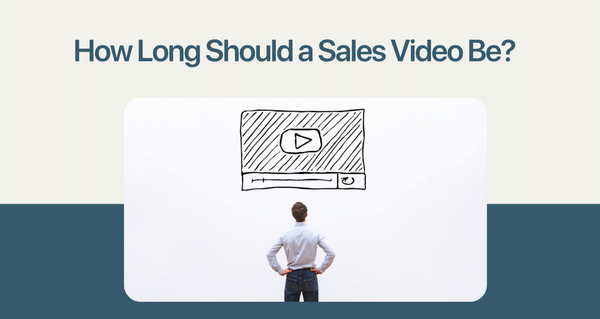Every prospect has sales objections for a reason. Because if the prospect wasn't hesitant to buy your product, then they would have already bought it!
Objection handling is a natural part of selling and it can be a significant roadblock when you're trying to move prospects through the pipeline.
You might even be tempted to accept their objections and send them straight away because they seem so reasonable based on what you know about the prospect's business.
Let's look at some of the typical sales objections first and then find out ways to tackle them.
“Sales Objections” - What Is It?
A sales objection is when the prospect states an issue with what you are selling and does not want to buy it (product or service).
For example, if your prospect says the price for your [X product] is too high, then it means that person does not believe in buying from you. He also thinks that buying it would not benefit them enough financially compared to other options available on the market.
Objections can be around the price, product fit, or competitors. Sometimes the objection is a good old-fashioned brush off!
Importance of Handling Objections Effectively
Sales objections can pop up during a sale. And without proper training or practice in handling these types of situations, it can be difficult for someone new at selling professionally.
Sometimes it can also affect an experienced seller who has never been trained on this topic before.
Objections handling are essential for several reasons:
- It protects the company and its product reputation against negative feedback or customer complaints that could result in a loss of future business opportunities if left unresolved.
- Salespeople who know how to handle objections can close more deals through effective communication.
As a salesperson, there are few essential things to take care of before you showcase your product. These can be considered as standard ground objection handling rules to work on:
- Will your product or service make a genuine difference to the prospect business?
- Are you approaching the right prospect?
- Do prospects need your product at this moment?
- Will you benefit from having them as your customer?
- Why should your prospect choose your product over your competitors?
The 4 Types Of Sales Objections
Knowing BANT (Budget, Authority, Need and Timing) is key to a successful sale. This phenomenon should be part of your qualification process routine because it helps you determine if the prospect needs the service/product they are asking for or not before wasting time on them that could've been used elsewhere.
1. Budget Objection - “It's Too Expensive”
Objections based on price are the ones you'll come across most frequently. That being said, it can be challenging to convince someone that your product or service is worth their money if they're hesitant about purchasing due to the financial risk involved with purchases.
As a sales rep, consider how much value there will be for customers after using your solution and paint this picture so that they feel like it's enough to reward considering the amount of risk taken to solve their problems.
2. Trust Objection- “I've Never Heard Of Your Company”
Many people are skeptical when they hear that I work for a small company. They think our products cannot be as good, or the services we provide will not be able to meet their needs.
Most of these concerns can easily be overcome with some research and honest communication on my part but there is one criticism in particular which keeps recurring:
"I've never heard of your company before."
A common objection when convincing someone to try a product for the first time is that they have never heard of your company.
The best way I've found to respond in these situations involves explaining why one might not be familiar with an organization, offering proof by mentioning some other companies/brands who are well recognized and also new, followed up by reaffirming confidence about what you're trying to sell them on.
3. Need Objection- “I Don't See How This product/Service Can Help Me”
When a prospect says, "I don't see how this product/service can help me," it might seem like an objection on the surface. But it's an opportunity to get information for further process.
Get more information by asking open-ended questions so that you can find out if there is a fit between your offer and prospect needs. Then, after finding one, demonstrate value to turn this into a sale!
4. Objection- “I Don't Have Time”
The goal is to identify if the timing is an issue or if the prospect isn't interested.
One way to do this is by asking them about their competing priorities and how you can fit them into their schedule.
If it's difficult for a customer to see your product as something that will improve their lives, then you'll have difficulty selling anything at all.
9 Common Sales Objections And How To Tackle Them
1. Where are You located? Unfortunately, I'm not familiar with your firm
When a prospect gives you an objection about your reputation, they don't trust your company. The objections can range from skepticism to how long you've been in the market.

How To Overcome With Example:
Great to meet you, FIRST_NAME!
My name is Joe, I am a Sales rep working at [ABC company] in Austin.
I love connecting with other professionals out there looking to make their lives easier through video collaboration.
It sounds like you're all about efficiency too, so let me know if there are ways we can help each other out.
Joe.
Also Read: 9 Personalized Video Email Examples To Keep Your Prospects Engaged
2. Just Send me the information, I'll look into it
Asking your prospects about their pain points helps you build a relationship with them, show that they believe in the product, and gives proof of how many people trust it.
You can highlight case studies or success stories to extract successful results from current customers so you know what others have trusted thus far.
Wondering how to take some of the pressure off your plate? Videoform is a new, easy way for you or your clients to engage with others. It takes only seconds to set-up and it's free!
Here are just a few stories from our happy customers:
"I have so much more time in my day now that I don't spend all morning trying to schedule appointments." - Adam
"Now instead of using up two hours on conference calls every week, we can use Videoforms!" - Jane
How To Overcome With Example:
Hi!
I get it, you're busy. That's why we built Videoform to help take some of the pressure off your plate.
It takes only a minute to set-up and seconds for prospects to reply back, so you can have more time in your day for what matters most.
Here are some ways that Videoform has helped our customers:
"Videoform saved me over 50 hours this month alone!" - John C., CEO at Company XYZ"I don't even need an assistant anymore." - Melanie H., Founder of Startup ABC
"Videoform allows me to stay connected with my sales team.To know more, You can reach me @ [Number]
Thanks,
3. That won't happen. We'll deal with it later, perhaps in December
Receiving an objection can be frustrating, but it's important to realize that the prospect may not even know what they're objecting to.
When you receive a delay request from your client, don't give in and reschedule; instead try to find out why they need extra time so that you can sell them better next time!

How To Overcome With Example:
Hey John,
Sounds like your sales team is having a tough time with video prospecting during this pandemic.
Are you planning to fix the situation soon? Or are we taking care of it at another date?
That would help me understand how you want us to approach that problem.
Thanks,
Mike.
When you ask a prospective client for feedback during the sales process, this is an appropriate question since that's what sales reps do and it helps understand prospects better.
4. We already work with [competitor]
When a prospect tells you they believe your competitor sells superior goods, ask if they've already formed an agreement with them. It's critical to create an emotional reaction rather than a logical one.
Create an emotional reaction by providing proof that you're offering something unique or better than what they currently have. If necessary, find out why they disagree and try to persuade them why your solution is the greatest alternative instead of pointing fingers at other businesses' flaws or how it is less expensive
You could say something like, "We're going to be competitive in terms of price compared with our competitors, but I'd love for us to talk about all the benefits we offer over every single one."

How To Overcome With Example:
Hi Dona,
I understand that our competitor [ABC] is offering the same product for half the cost.
I know they are a great company but unfortunately their lack of an integrated email platform might make it difficult to answer your questions.
Our own software does just this! It makes answering customer questions much easier via integrated email.
Our software helps you keep all your contact information in one place so you can respond quickly.
We're going to be competitive in terms of price compared with our competitors with much more additional features.
Thanks,
5. We want more/different features, and we want to know if it can do [XYZ]
When a prospect uses this objection, it can mean two things: either they're genuinely looking for an alternative solution with that particular feature, or they still think your product is simply something to dabble in and are yet to be convinced.

How To Overcome With Example:
"Yes, I can help you. Our tool works with Calendly, which means that you'll be able to book meetings without having to switch tabs or worry about forgetting them. This is because we will send reminders before your meeting so there's no chance of missing it for any reason at all."
In the above example, ask your prospect where they struggle and then paint a picture of how you can help them.
If their request isn't possible with what you have to offer, it's something on which both parties could agree upon as an improvement or addition rather than replacement for the current solution.
Also Read: The Definitive Guide to Introducing Yourself In A Sales Email
6. I'm not an authorized person to sign off on this purchase
No problem! To ensure that you are talking to the right person, ask your prospect for their name and then transfer them over.

How To Overcome With Example:
Thanks for the info! Would you please tell me who to speak with? Can you please send their contact information?
7. We don't have the budget
If a prospect tells you that they're low on funds, there is likely to be an issue with the company's budget or their cash flow.
You can help them secure funding either by convincing executives of its importance or arranging for another call in a few weeks so your prospects will have secured more financial resources.
How To Overcome With Example:
Hey, I just wanted to touch base regarding that project you mentioned. When will you get the funds? It would be great if we could schedule a follow-up call when this happens so I can get your input on some ideas for the next phase of development.
8. No, we're not interested in it
During a prospecting call, don't ask if the person is interested in your product or service. Instead, send over some resources and schedule another meeting to discuss further.
How To Overcome With Example:
"No, I get it. Let's schedule a time to chat again. In the meantime, we can figure out what resources you need."
Before you give up on a customer, make sure to understand what the problem is. For example, if it's not your product that they're refusing, then maybe someone else has approached them already or perhaps this isn't even their main concern right now.
It could also be possible that something more significant than our product may have come up and prevented potential customers from buying into us just yet.
9. I don't see the potential for Return on Investment
Don't give up on ROI so quickly. If you want to show your prospect the value of this product, prepare a formal pitch either for them or their managers using any internal numbers they can provide and case studies from other companies who have used it successfully. Nothing sells quite like complex numbers!
How To Overcome With Example:
"I'd love to show you the benefits of our product and how it can make a positive impact on your business. So let's schedule some time where I get together with you, or we do a webinar so that everyone has access."
When To Take No For An Answer?
Sales can be a little challenging. It requires perseverance and courage to approach potential customers, especially when you aren't sure if they're interested.
You might think that they are on the verge of getting convinced but then get rejected at the last minute! How do you handle this sort of situation?

Being disheartened is natural after an encounter like that; however, it's just part of being in sales, so try not to let it affect your performance too much in the future.
Creativity and a strong hook are crucial to closing the deal. You might be pitching your product or service perfectly, but if you can't keep the person interested in buying it, then you won't get what you want – their business!
Here is a quick tip that can come in handy when you're trying to secure an order:
Scenario:
"We've used up our budget for products similar to yours," the customer says.
Response:
You can ask them what kind of products they have invested in and be prepared with an answer to explain how your product performs better even within the same category.
Ask them about the problem so you get a chance to explain that those would never occur if they were using your product.
In such situations, it's best not to criticize competitors but focus on talking up our virtues instead.
Conclusion
It is essential to understand the different types of leads you will encounter throughout your process to improve sales outcomes.
Some objections are legitimate reasons for disqualification, while others attempt to brush off a discussion with you.
As long as we familiarize ourselves with common objections and have answers prepared in advance, we can successfully identify which prospects show potential for business growth based on their needs and goals!




